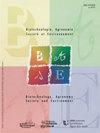Convergence to IFRS standard and smoothing results in electric power companies
IF 0.6
4区 农林科学
Q3 AGRONOMY
Biotechnologie Agronomie Societe et Environnement
Pub Date : 2017-12-30
DOI:10.4013/BASE.2017.144.04
引用次数: 2
Abstract
The objective of this research is to analyze if there has been an increase in earnings management level (GR) using the income smoothing method in the electricity sector companies listed on the B3 with the adoption of the accounting standards of the IASB. The proposal is timely, since, due to the greater flexibility of the rules, there is the possibility of a greater GR. On the other hand, it is a heavily regulated industry, prompting, in turn, the possibility of this factor inhibiting such practices. Were analyzed the financial statements from 2003 to 2007 as the preconvergence period, and 2010 to 2014 as the post-convergence period. As GR proxy, the variance of waste equation proposed by Chen et al. (2010) and Barth et al. (2008) was considered, with adaptations, where a smaller variability in net profit is seen as practice for greater smoothing results and higher GR. The research findings show a reduction in the level of income smoothing after the adoption of IFRS (International Financial Reporting Standards). In fact, the findings indicate that the adoption of international standards for companies in that sector can improve the quality of accounting information and therefore reduce the earnings management levels, mainly due to the demand for greater disclosure and quality of financial reporting, corroborating with the results of the researches of Barth et al. (2008), Iatridis (2010) and Chen et al. (2010). Keywords: income smothing, electricity sector, international standards.趋同IFRS准则和平滑结果在电力公司
本研究的目的是分析在采用国际会计准则委员会会计准则的情况下,B3上市的电力行业公司是否使用收入平滑法提高了盈余管理水平。这项提议是及时的,因为由于规则的灵活性更大,有可能出现更大的GR.另一方面,这是一个受严格监管的行业,反过来,这一因素也有可能抑制这种做法。我们分析了2003年至2007年作为前收敛期,2010年至2014年作为后收敛期的财务报表。作为GR代理,考虑了Chen等人(2010)和Barth等人(2008)提出的废物方差方程,并进行了调整,其中净利润的较小可变性被视为更大的平滑结果和更高的GR的实践。研究结果表明,采用IFRS(国际财务报告准则)后,收入平滑水平有所降低。事实上,研究结果表明,对该行业的公司采用国际标准可以提高会计信息的质量,从而降低盈余管理水平,这主要是由于对财务报告的披露和质量的要求,这与Barth等人的研究结果相印证。(2008),Iatridis(2010)和Chen等人(2010)。关键词:收入烟雾,电力行业,国际标准。
本文章由计算机程序翻译,如有差异,请以英文原文为准。
求助全文
约1分钟内获得全文
求助全文
来源期刊

Biotechnologie Agronomie Societe et Environnement
AGRONOMY-ENVIRONMENTAL SCIENCES
CiteScore
1.60
自引率
0.00%
发文量
12
审稿时长
6-12 weeks
期刊介绍:
BASE publishes original papers in the fields of life sciences: environmental science and technology, forest and natural space management, agronomical science, and chemistry and bio-industries.
 求助内容:
求助内容: 应助结果提醒方式:
应助结果提醒方式:


